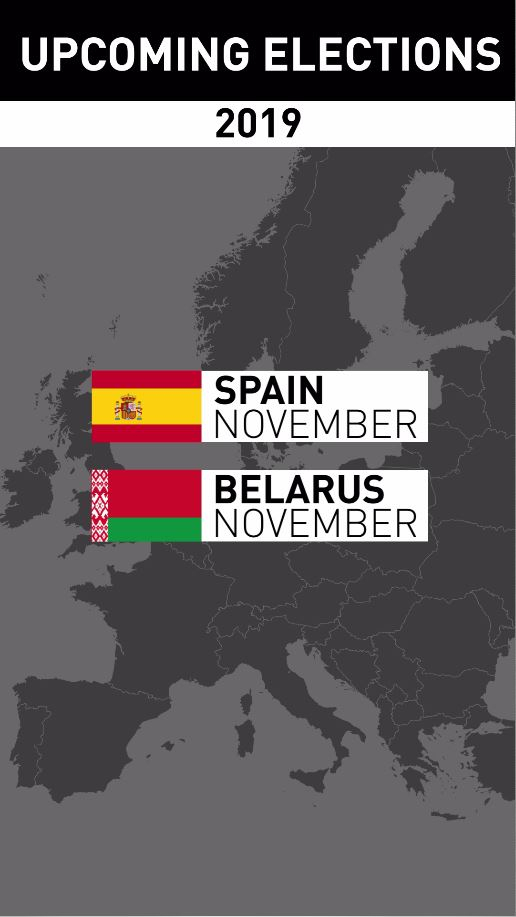01:25

Amid the noise emerging from Westminster, you could be forgiven for thinking the UK was the only European country gearing up for a parliamentary election. But across the continent, parties are jostling for position as their country prepares to go to the voting booth.
So who is up for the public vote and who is in for the long haul? Here, CGTN looks at the currently expected election dates across Europe. Parliamentary systems can be complicated and various, so we have ignored presidents and upper houses and stuck to each country's lower house - the ones with the most representatives voted for by the public.
Recently elected
Austria elected its lower house on 29 September, the People's Party winning the most votes; the next election is due by 2024. Portugal voted a week later on 6 October, the Socialist Party overtaking the Social Democratic Party without achieving a majority. Portuguese election dates are in the gift of the president, but always fall between mid-September and mid-October and the term is four years.
Poland voted on 13 October, with the Law and Justice party retaining a thinned-down majority for a maximum four-year term. Switzerland voted for its Federal Assembly on 20 October, the Swiss People's Party remaining the largest, but with a reduced share. Again, it is a four-year maximum.

Spanish Socialist leader Pedro Sanchez casts his vote in April; he'll be back next month (Credit: AP Photo/Bernat Armangue)
Spanish Socialist leader Pedro Sanchez casts his vote in April; he'll be back next month (Credit: AP Photo/Bernat Armangue)
Upcoming elections
Next to the polls is Spain, on 10 November - a second election in 2019. Although the lower house sits for a maximum four years, April's results eventually caused deadlock; the Spanish Socialist Workers' Party will be hoping to extend its majority to a workable size or agree a coalition with the Citizens Party.
A week later on 17 November, Belarus will choose its 110-strong House of Representatives, for a maximum four years; the Communist Party is expected to win in a country where real legislative power lies with the president.
Spring elections are due in Slovakia (by March), Serbia (by April) and North Macedonia (April), with Georgia, Lithuania and Montenegro set to vote by October. Also due to vote before the end of 2020 are Azerbaijan (November) and Croatia (December).

Cypriots will be back in the booth in May 2021 (Credit: AP Photo/Petros Karadjias)
Cypriots will be back in the booth in May 2021 (Credit: AP Photo/Petros Karadjias)
Further away
Elections in 2021 will be due in Romania and the Netherlands (March), Republic of Ireland (April) and Bulgaria and Cyprus (May). Germany will vote some time between August and October 2021 - perhaps coinciding with September elections in Russia and Norway or October votes in the Czech Republic and Iceland.
Further ahead, there are 2022 elections scheduled in Hungary (April), UK (May), France, Malta and Slovenia (June), Sweden (September) and Latvia and Bosnia-Herzegovina (October). Among the elections penciled in for 2023 are Estonia (March), Finland (April), Italy (May), Denmark (June), Greece (July), Ukraine (October) and Armenia (December), while those whose five-year terms started this year, allowing them to relax until 2024, are Belgium and the EU itself.

Theresa May knows the power and peril of polling (Credit: AP Photo/Frank Augstein)
Theresa May knows the power and peril of polling (Credit: AP Photo/Frank Augstein)
...but realpolitik almost always outvotes the calendar
It is important to reiterate, however, that many of the above dates will be rendered irrelevant by the ever-changing nature of politics. If a country is in disarray, the ruling party may be forced into an early election; conversely, if things are going well, a government might take advantage with a fresh election to restart its legislatory clock while in a position of strength.
After all, few things in politics are ever certain, no matter how specific the plans. The UK's Fixed-Term Parliaments Act in 2011 scheduled an election for the first Thursday in the May of every fifth year, but after the May 2015 vote realpolitik - and specifically Brexit - intervened.
Theresa May called a snap election in June 2017 which weakened her position rather than strengthening it. As Brexit rumbles on, the country is widely expected to vote again soon, perhaps as early as December 2019. As May discovered when she lost her majority, elections are rarely predictable.